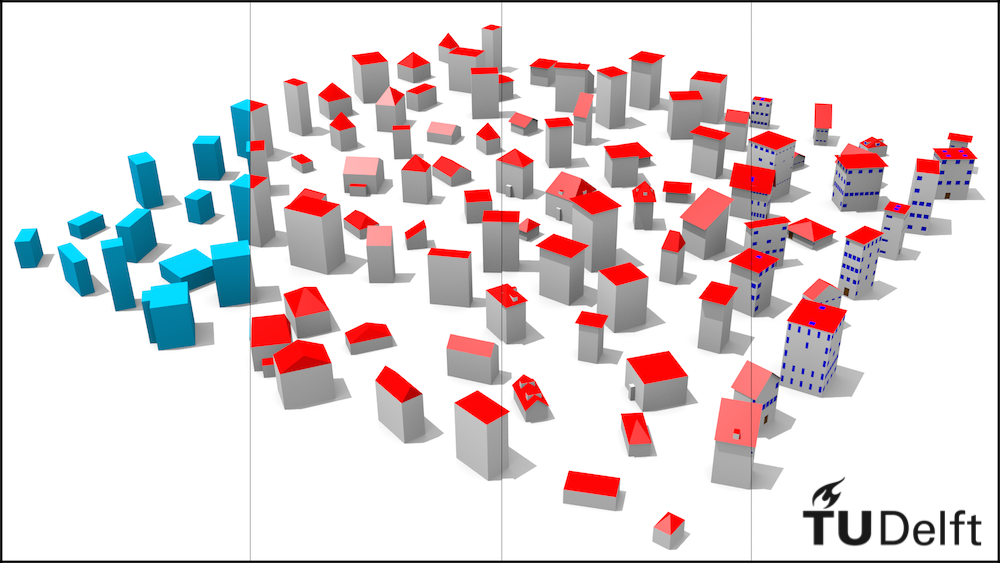Openings
Collection of currently open thesis topics with me
Coral Reef Complexity - G. Brouwer [Status: Ongoing]
Corals [cnidarians] provide a safe and nutrient-rich environment for various aquatic organisms to coexist, significantly enhancing local biodiversity. However, global coral reef health has been in decline over the past few decades due to increased ocean acidification. Consequently, there is a growing scientific interest in understanding the life cycle of corals. One aspect of coral reefs is the connection between coral reef complexity and coral health. From a hydrodynamic perspective, there is growing evidence that the coral complexity [i.e., fractal dimension] acts to increase the mass transfer rate that enables the growth of coral communities; both isolated coral reefs, and collective communities (Monismith, 2006).
In this MSc thesis you will work on spatially characterising the coral reef communities using urban geoinformation tools to provide conventional metrics such as clustering, dimension, roughness, etc. These metrics can be used to understand any correlations between the health of the coral reef and the spatial characteristics. Additionally, characterising the spatial features of coral reefs can enable flow simulations to better understand the hydrodynamics as shown in the figure below. The thesis will broadly consist of the following three steps:
- Literature review: A thorough literature survey to understand the state of the art for characterising coral reef complexity and its connection to coral health.
- Data curation: Database search for coral reef point clouds (yes, we scan corals!) that are freely available. A good starting point would be USGS [https://cmgds.marine.usgs.gov/data-releases/datarelease/10.5066-P93RIIG9/], The Smithsonians digitisation collection [https://3d.si.edu/corals].
- Algorithm development: Develop independent morphology algorithms to characterise individual coral and coral reefs similar to urban planning metrics. A good starting point would be the metrics you implemented for GEO1004, Homework 02. e.g., EUBUCCO [https://github.com/ai4up/eubucco], 3D-Building metrics [https://github.com/tudelft3d/3d-building-metrics]
Skills required: Python programming and GEO1004

Contact: Akshay Patil, Hugo Ledoux
Random City Engine - O. Post [Status: Ongoing]
The ability to generate a stochastic [random] urban landscape can enable a wide range of engineering activities: testing processing code, prototyping building characterisation codes, parameter dimensionality reduction for Computational Fluid Dynamics [CFD] studies, and animation/gaming sectors.
In this MSc thesis, you will work on procedural modelling of 3D cities using a three-fold approach:
- Literature Review: Explore the existing literature to determine the parameters of interest necessary to characterise the urban landscapes using limited number of parametric inputs. Here the central focus is to capture the essential “ingredients” required to generate a synthetic cityscape that is similar to real cities (similar heights of buildings and distribution)
- Stochastic Characterisation: In this step, you will develop a code to study the 3DBAG dataset and stochastically characterise various cities. Using the parameters of interest found in the literature review, a probabilistic characterisation should be developed.
- Procedural Modelling: Using the probabilistic characterisations formulated in the second step, you will implement a model to procedurally create new cities that are stochastically similar to the cities analysed in the second step. Here you will validate the method extensively by testing input parameters such as sampling size, clustering, canopy density, etc.
Skills required: Python programming + GEO1004.

Contact: Hugo Ledoux, Akshay Patil
Experimental and numerical study on the impact of tsunami waves on breakwaters - E. Forte [Status: Ongoing]
Role: Advisor on computational fluid dynamics
Faculty of Civil Engineering and Geoscience
Contact A. Antonini, D. Wüthrich, A. Patil
Development of a Large-Eddy Simulation model for flows over urban areas with application to the TU Delft campus - S. Zhang [Status: Completed]
Role: Mentor
Faculty of Mechanical Engineering
Contact W.P. Breugem, P. Costa, A. Patil